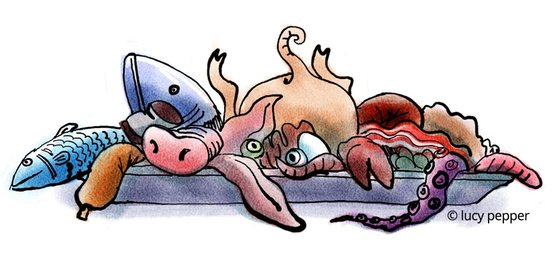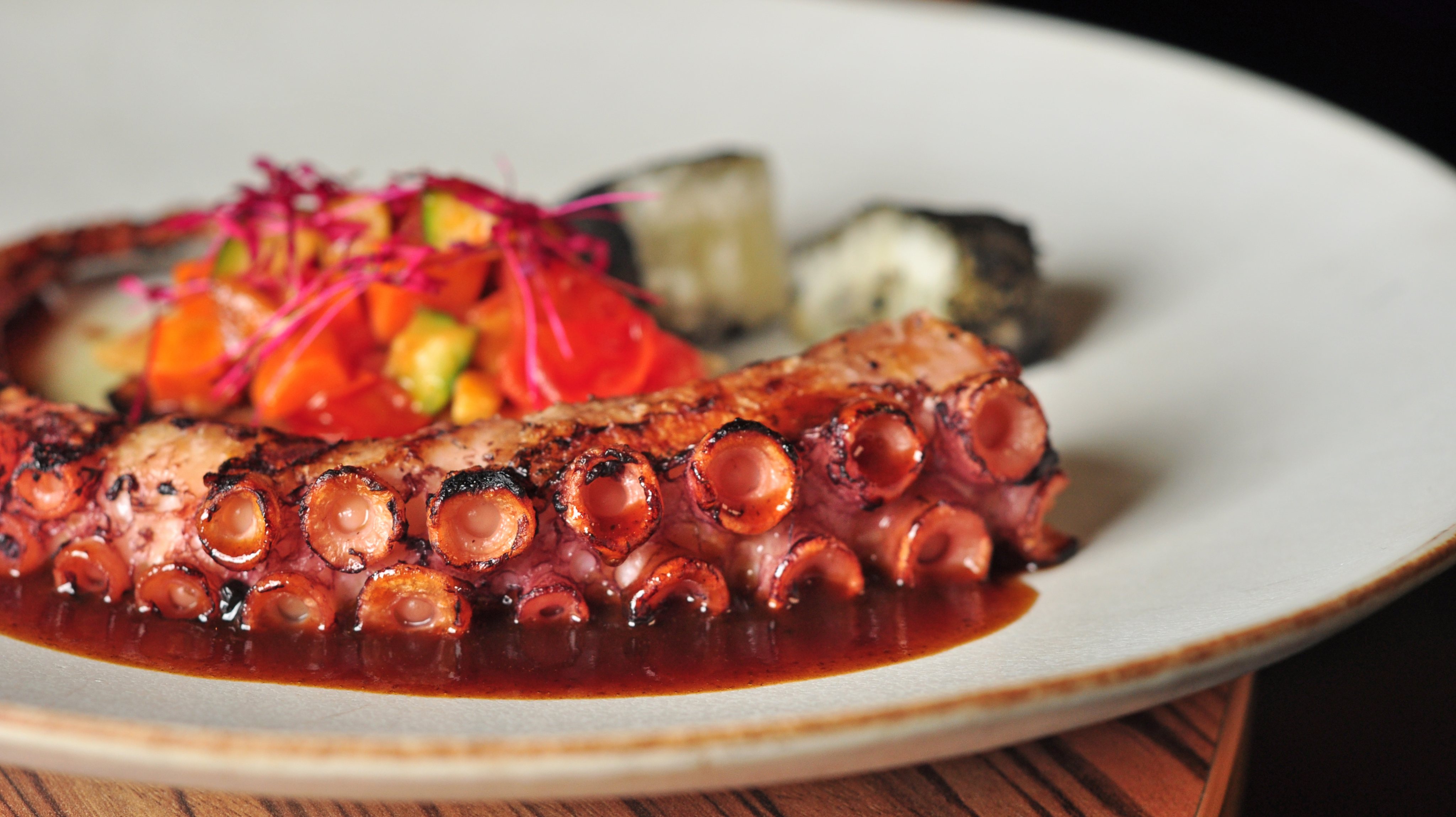Há duas coisas que oiço muitos vezes quando falo com um português pela primeira vez. A primeira é “Ah, fala português!” A segunda, depois de uns minutos de conversa educada, é esta: “Desculpe, mas é verdade: a comida inglesa é horrível.”
Pobre cozinha inglesa: depois de o puritanismo Victoriano, no século XIX, ter dado cabo dela, a Segunda Guerra Mundial atacou-a de todos os lados. Sim, a comida em Inglaterra foi, em tempos, uma porcaria. Quando era miúda, só se comprava azeite na farmácia, provavelmente para despejar nos ouvidos, e o panado de “spam” constava regularmente do menu da escola. Tenho a sorte de ter uma mãe que é cozinheira profissional, e por isso, comi sempre comida fantástica em casa, tanto pratos ingleses como estrangeiros. Mas fora de casa, é verdade: também comi muito mal, como o visitante português… mas agora não.
As pessoas que dizem que toda a comida inglesa não presta, não sabem do que falam. Talvez tenham ido a Londres durante um fim-de-semana e comeram no equivalente daqueles restaurantes pirosos que enchem a Rua Augusta. Se calhar, comeram num pub, não nos novos pubs que especializam em comida caseira e artesã, mas no tipo normal, que transforma uma coisa congelada numa coisa microondizada. É possível que tenham ido a um “greasy spoon”, aquela espécie de cafés que servem pequenos almoços com “baked beans”. Não sabem a razão por que, de dois em dois anos, me apetece tanto “fish & chips”, antes de me enjoar (é para matar saudades). Ou talvez essas pessoas tenham comido os mesmos “fish & chips”, mas sem perceberem que não é suposto serem a mesma coisa que sardinhas grelhadas com um bom pão e uma salada bem temperada. Ou talvez tenham comido uma coisa maravilhosa e simplesmente não gostaram. É permitido. A verdade é que não sabem as razões nem as histórias nem os sítios bons para comer em Inglaterra. E isso também é permitido, claro.
Mas alguns nunca puseram um pé em Inglaterra, e dizem com convicção que a comida é uma merda.
Sabem uma coisa? Há muita gente que diz a mesma coisa da comida portuguesa. Já ouvi ingleses a queixar-se que a comida em Portugal tem aspecto horrível, ou que é gordurosa demais, ou que é só papa. Também ouvi Espanhóis, Franceses e Alemães a proclamar: “Ui! Olha para aquilo! Que nojo!”
Ou seja, ELES não sabem do que estão a falar.
Não sabem nada da culinária, nem da história, nem da cultura ou dos hábitos deste país. Não sabem que a comida é uma obsessão portuguesa. Que é o principal tópico de conversa, mais do que o tempo ou a política, e isso quer dizer que há muita conversa. Mas sendo a comida tão importante para os portugueses, o facto é que a culinária portuguesa é ainda pouco conhecida no resto do mundo. (Apesar dos meus esforços).
Na sua primeira visita, o que espera o turista? Talvez cozinha espanhola ou nada mais interessante do que um peixe grelhado ou um frango piri-piri, o qual, devido a uma certa cadeia sul-africana de restaurantes, é hoje considerado por muitos estrangeiros como o prato nacional português.
O turista não conhece os restaurantes fora dos circuitos habituais, os que têm uma especialidade esquisita, como asas de raia ou um arroz de lampreia ou algo igualmente horrível (não, nunca vou me habituar à ideia de comer o sangue de vários bichos do rio, quente e avinagrado, ligeiramente filtrado através o corpo do peixe mais feio daquele mesmo rio). O turista ignora a Mealhada e os seus fornos de aspecto arrepiante, cheios de leitões deliciosos e estaladiços.
O turista não repara em como os portugueses se deliciam a desfazer lentamente uma comida intrincadamente construída pela mãe natura, como a sapateira ou a cabeça de peixe, ou a picar em coisas pequenas como tremoços ou caracóis ou pica-pau, entre conversas e cervejas.
É pouco provável que o turista tenha tempo para se habituar a certas coisas, aquelas coisas que precisam de tempo para serem aceites por um paladar não-português… em termos de textura. Imagine a açorda: ao primeiro encontro, é como comer pão já mastigado por outra pessoa. O turista não vai ter tempo suficiente para apreciar que uma confeição feia, como um prato cheio de cozido ou uma panela de dobrada à moda do Porto, é realmente uma beleza, porque está à espera de guarnições e arranjos desnecessários. O turista nunca terá tempo decifrar as montras de bolos e sobremesas, todos na escala de cor “amarelo a castanho”.
O turista sortudo é aquele que fica em Portugal o tempo suficiente para provar um bocado de tudo, para aturar o cheiro de bacalhau seco, para ultrapassar o melindre de comer bebés porquinhos ou cabeças de pescada. É aquele que aprende a gostar de trincar na cartilagem, ou de comer couve lombarda ensopada, cheia dos sabores dos enchidos do cozido, ou de comer peixinhos minúsculos ainda com cabeças.
Nós cá em Portugal adoramos a cozinha portuguesa… porque sabemos o que é bom, onde é bom e quando é bom. Sabemos onde a comida é nojenta e evitamo-la. Tivemos tempo para aprender a gostar da comida, a desejá-la.
É a mesma coisa em todos os lados. Já comi as mais fabulosas versões de tostas, leitões, bacalhaus à Brás, arrozes de marisco, bolos, sobremesas, bifanas, cozidos, etc., etc., etc. Mas também já comi versões miseráveis de tudo isso. Tal como você já comeu.
(Tradução da autora a partir do original inglês)
Hell is other people’s cooking.
There are two things I often hear when I meet someone Portuguese for the first time. The first is “Oh, you speak Portuguese!” Then, after a few minutes of polite conversation, “I’m sorry, but it’s true, English food is awful.”
After the Victorians gave it a good bashing, and then the second world war attacked it on all fronts, English cuisine, yes, was pretty ropey. When I was a child, olive oil could only be bought in the chemist, probably prescribed for pouring into ears or something, and the spam fritter was served up at school regularly. I am lucky enough to have a professional cook for a mother, so I always ate fantastic English and foreign food at home, but I have eaten as badly as you have, all over the country… but not any more.
The people who say that all English food sucks don’t know what they’re talking about. They may have been to London for a weekend and eaten in the equivalent of those nasty restaurants that litter Rua Augusta. They may have eaten in a pub, one of the not-a-fabulous-artisan-gastro pubs, but the bog standard ones that take a frozen thing and turn it into a microwaved thing. They may have been to a greasy spoon where everything comes out of tins. They don’t know why I long to eat fish and chips… once every couple of years, before I feel a bit sick and give up (nostalgia). They might have eaten the same fish and chips and not understood that it’s not supposed to be the same as grilled sardines sitting atop a slice of sourdough and served with a vinegary salad. Hell, they may have eaten something amazing, and just not liked it. It’s allowed. They have no idea why and how and where people eat what. That’s also allowed.
Some have never even visited England and still confidently say that English food is disgusting.
Guess what. Other people say the same about Portuguese food. I’ve had English people telling me that it looks awful, that is too greasy, that it’s a just load of mush. I’ve heard Spaniards and French and Germans saying “ugh, look at it, it’s hideous!”
Or rather, THEY don’t know what they’re talking about either.
They know nothing about the food, its history, the culture and habits surrounding it. They don’t know that eating obsesses the Portuguese. It is the subject of more conversations than even politics or the weather, and that’s a lot of talking. And considering how extremely important Portuguese cuisine is to the Portuguese, how highly the Portuguese regard it, isn’t it odd how little is known outside of Portugal about Portuguese food culture (despite my efforts)?
On his first visit here, a tourist might expect either Spanish cookery or nothing more interesting than grilled fish or piri-piri chicken, which, because of a certain South African chain restaurant, is what many people believe to be the Portuguese national dish.
He doesn’t get invited to off-the-beaten-track restaurants that have a speciality dish of, say, skate wings, or lamprey stew or something equally horrible (no, I will never come round to the idea of eating the hot, vinegary stewed blood of various water creatures lightly filtered through the ugliest river fish there ever was). He doesn’t know of the existence of Mealhada and its disturbing looking ovens filled with delicious crispy suckling pig.
He doesn’t notice the sheer delight the Portuguese take in slowly dismantling intricately constructed (by mother nature) food, like crabs or fish heads, or in picking at little things while chatting over a beer, like tremoços or snails or pica-pau.
It’s unlikely that he will have time to become accustomed to things that require some time to become acceptable to the non-Portuguese palate… in terms of texture. Think of açorda which, to everyone else, at first, is just like eating someone else’s pre-chewed bread. Portugal does like mush. He won’t have time to appreciate that an ugly concoction, like a plateful of cozido, or a pan of tripe and beans or broad bean stew is actually beautiful, so accustomed to pretty arrangements of food on plates. He doesn’t have time or knowledge to decipher the windows full of cakes or the cabinets full of puddings that are all on the colour scale of yellow through to brown.
The lucky tourist is the one who stays long enough to try a little bit of everything, to get used to the smell of dry bacalhau, to get past his squeamishness about eating baby pigs or fish heads. He is the one who learns to enjoy crunching into cartilage, or eating over-boiled Lombard cabbage that has soaked in all the flavours of the sausages in a cozido, or eating tiny fishes with their heads still on.
We here in Portugal love Portuguese cooking… because we know what’s good, where it’s good and when it’s good. We know where the food is disgusting, and avoid it. We have had time to grow to love it and long for it.
It’s the same as everywhere else. I have eaten the most fabulous tostas, leitões, bacalhaus à Bras, seafood rices, cakes, puddings, bifanas, cozidos. I have also eaten unspeakably bad versions of all of them.
Be honest, so have you.











